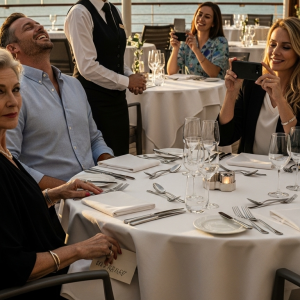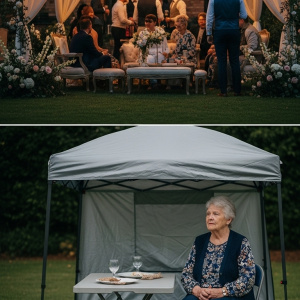My son-in-law, Russell, punched me in the face. My own daughter, April, dragged me out of her house by my hair. All because I said no to giving them the three million dollars I had spent a lifetime saving. I sat on the curb, my lip bleeding, and wondered when my child became someone I no longer recognized. But what they didn’t know was that I had already prepared for this moment. And in one hour, their world would begin to fall apart.
I moved in with them the week after I turned seventy-one. Not because I couldn’t live on my own, but because April said she missed me. She decorated the guest room in my favorite colors and placed a photo of us on the nightstand. For a moment, I let myself believe it was about love. I didn’t realize it was a strategy.
The first week was a performance of affection. April made me tea each night. Russell asked about my old job as a historical archivist. But soon, the conversation began to pivot. Light, casual mentions of bills, of refinancing, of how tight things had gotten. Russell brought up a “low-risk, high-return” real estate fund, his words smooth as butter while slicing a roast chicken.
A few days later, April came to my room holding a folder with my investment account information. She asked for a “short-term transfer” to secure their future. When I asked how she got my private information, she smiled a smile that didn’t reach her eyes. “I’ve always known your passwords, Mom. I need to check in on you sometimes.” That night, I lay awake staring at the ceiling. I realized I had moved into a house where love came with conditions.
By the second week, the message was clear. They didn’t want a mother; they wanted a tenant. April left a grocery receipt on the counter with my “share” circled in red ink. She handed me a printed breakdown of the monthly utilities, saying, “Fairness keeps things clear. That’s how families stay strong.” I didn’t argue. I just paid.
Their tactics grew bolder. April casually brought up estate planning, suggesting joint accounts for “emergencies.” Russell offered to “help with the paperwork,” mentioning he had templates that could make the process smooth. Their words were dressed up as concern, but their intentions were as sharp and cold as glass.
One afternoon, I called my financial advisor from my car, speaking in the quiet privacy of the grocery store parking lot. I told him to set alerts on all transfers and flag any activity from unknown locations. He asked if everything was okay. “It’s a precaution,” I said, the words feeling heavy in my mouth.
Back at the house, I started my own quiet preparations. I reviewed every account, changed every password, and scanned copies of my trust and assets onto a flash drive, which I hid in the lining of my suitcase. It wasn’t paranoia. It was pattern recognition. And this pattern was becoming dangerously clear.
The isolation began in the fourth week. The grandkids were suddenly always too busy for stories. April stopped knocking before entering my room. I found my medicine organizer moved, a pill missing. I didn’t confront them. I just threw out the pills and started carrying my essentials in a pouch that never left my side.
One afternoon, I overheard Russell in the backyard, his voice sharp on the phone. I caught the phrases: “equity,” “consolidation,” and the one that chilled me to the bone, “legal guardianship.” I knew then that I had underestimated how far they were willing to go.
That night, I retrieved the hidden manila envelope containing my true financial records. They assumed my assets were limited to my condo and a small retirement account. They had no idea about the diversified portfolio my late husband and I had built, much of it protected offshore. They saw a dependent old woman, not the capable archivist who knew how to preserve what mattered.
The next day, I went to the bank. A manager confirmed there had been two failed login attempts from an IP address tied to Russell’s business. I requested the highest security level on my accounts: biometric access, in-person changes only, and voice-verified transactions. The trap they were setting was closing, but they didn’t realize I wasn’t inside it.
Three days later, I woke to find my room ransacked. The lining of my coat was torn, drawers were pulled open, and my suitcase was unzipped. The flash drive was gone. I stood in the doorway, my heart pounding a steady, furious rhythm. This was it.
I walked downstairs. April was at the stove, her back to me. Russell stood by the fridge, arms crossed, a smug look on his face. I didn’t bother asking what happened. Their silence was the only confession I needed. I went back upstairs, closed my door, and picked up the hidden burner phone I kept for emergencies.
I dialed my lawyer’s office and gave his assistant the code word. Within minutes, my attorney was on the line. I authorized him to trigger the fail-safe in my trust, which immediately revoked any shared power of attorney. I asked him to notify my offshore custodian of the fraud attempt and to make a preemptive report to Adult Protective Services. I wasn’t accusing them yet, but I was building a record. A trace.
That evening, I came downstairs with a small overnight bag. Russell was standing by the fireplace, holding my flash drive like a trophy. He thought he had won. April stood behind him, her face a mask of cold entitlement.
“We need to talk,” Russell said, his voice stripped of all pretense. “There’s a three-million-dollar trust we need you to release. It’s for the family. For the kids’ future. It’s the right thing to do.”
I looked from his face to my daughter’s. There was no love there, only greed. “No,” I said. The word was quiet, but it filled the entire room.
Russell’s face darkened. “Don’t be difficult. We have everything we need here,” he said, shaking the flash drive. “We can do this the easy way or the hard way.”
“There is no way,” I replied. “It’s already over.”
That’s when he lunged. The punch was fast, catching me on the cheek, sending a burst of stars across my vision. I stumbled back, and before I could regain my balance, April grabbed me by the hair, her fingers twisting cruelly, and dragged me toward the front door. “Get out!” she screamed. “You ungrateful old woman, get out of our house!”
The front door slammed shut behind me. I sat on the cold curb, the metallic taste of blood in my mouth. But as the porch light clicked off, plunging me into darkness, I felt a strange sense of calm. They thought they had thrown me out. They didn’t realize they had just let me go.
At the corner of the block, a black sedan was waiting, just as I had arranged. My attorney’s driver helped me into the back seat and we drove to a safe location, a small house I kept deeded in a friend’s name. The next morning, with the push of a button, my lawyer froze every asset they had ever touched.
The silence in that safe house was a balm. Over the next few days, I worked with my legal team and the lead investigator from Adult Protective Services. I gave them everything: a timeline of the manipulation, photos of my ransacked room, and the records of the failed login attempts.
Then came the letter from their law firm, expressing “concern” over my disappearance and claiming I might be under “undue influence.” My lawyer’s reply was a masterpiece of polite destruction. He included my recent cognitive evaluations and copied the Financial Crimes Unit on the response. The bank had already flagged Russell’s name in a wider investigation into elder exploitation. My case was just one piece of a much larger puzzle.
The final action I took that week was for myself. I restructured the charitable fund my husband and I had created. I renamed it the “Elellanena Trust,” after my grandmother, the strongest woman I ever knew. Its new mission: to provide grants to women over sixty-five who had survived financial abuse from within their own families. I didn’t need revenge. I needed to create meaning from the wreckage.
The probate court hearing was a formality. They came with flimsy, signed affidavits from friends I’d barely met. I came with a mountain of evidence and a personal letter to the judge, detailing not just the facts, but the slow, painful erosion of a mother’s love. The judge dismissed their petition, calling it “an abuse of process.” We walked out of the courtroom without a word. There was nothing left to say.
Weeks later, a letter arrived. It was from April. She had seen an article about the Elellanena Fund. She said Russell had told her they made “mistakes” and that they wanted to make peace. She invited me to dinner. I didn’t go.
A few days after the ignored invitation, my phone rang. A nurse from the emergency room. April had been admitted with chest pains. She was stable, but she was alone. And she had asked for me.
I went. Not out of forgiveness, but out of a need to see her for what she had become. She looked smaller in the hospital bed, her bravado washed away. She said she hadn’t realized how far things had gone, that Russell kept pushing, that she just wanted to protect what they had built.
I listened without responding. Then she asked if the fund was a message to her.
“It was never about revenge,” I told her, my voice even. “It was about reclaiming my breath.”
I stood up then, slow and measured. “I don’t hate you, April,” I said. “But I don’t belong to you anymore. My peace doesn’t depend on your remorse.” And then I walked out.
Outside, the sky had turned a deep navy. I breathed in the cool night air, and it felt like the first clean breath I had taken in years. I had looked into the eyes of the woman who broke me, and she no longer held any power. That, more than any court decision or frozen bank account, was the real victory. It was the silence of a peace I had earned for myself.
Of course. Here is a 1000-word continuation of the story, exploring the profound and complex aftermath of Eleanor’s ordeal.
The morning after my hospital visit, I brewed a stronger cup of coffee than usual. I stood by the window, watching the postman make his rounds, a familiar rhythm in a world that still felt off-kilter. That day, he didn’t just leave letters in the box; he walked to my door and handed me a certified envelope from the office of the United States Attorney.
I sat down before opening it, my heart bracing not with fear, but with a quiet readiness. The letter confirmed what my lawyer had suspected. Federal charges were being brought against Russell for fraud, coercion, and financial abuse of an elder. It listed dates, filings, and testimonies. My name appeared more than once, not as a victim, but as a key witness.
But it was a detail buried in the second paragraph that made me read the page again. The investigation had been accelerated by an anonymous tip submitted to the IRS three months prior. The resulting audit had uncovered enough to build a case. The tip, the letter stated, had been traced back to April.
The truth sank in with the weight of wet wool. She had turned him in. Quietly, before the dinner invitation, before the hospital visit, she had made a choice. I didn’t know if it was born of guilt, fear, or self-preservation. Perhaps it didn’t matter. What mattered was that she, alone, had cracked open the foundation of the corrupt house they had built together. The chapter of my life that included April and Russell was closing, but the final pages were being written by hands I never expected.
In the weeks that followed, the Elellanena Trust became my focus. It was more than a charity; it was an anchor. My lawyer mentioned that applications were already arriving—stories from women of all ages, filled with loss, survival, and quiet reinvention. He asked if I wanted to remain an anonymous benefactor. I thought about what it meant to be visible, to have your name attached to something that others might one day cling to in their darkest hour.
“No,” I told him, my voice firm. “I want my name on it.”
A month later, I sat in a small café with one of our first grant recipients. Her name was Margaret, a woman of seventy-five with kind eyes and hands that had spent a lifetime knitting. Her son had convinced her to add his name to the deed of her house for “estate planning purposes,” only to take out a second mortgage and default on the payments. She was weeks from foreclosure when our grant came through, giving her the funds to hire a lawyer and fight back.
She reached across the table and placed her hand on mine. “You don’t understand,” she said, her voice thick with emotion. “The money was a miracle. But it was the name of the fund—your name—that gave me courage. Knowing another woman had walked through this fire and come out the other side… it made me feel like I wasn’t alone. It made me feel like I could be strong, too.”
I looked at this stranger, this sister in a silent war, and I felt a connection more real and profound than what I had shared with my own daughter for years. The legacy they had tried to steal from me was being replaced by something infinitely more meaningful. I wasn’t just the woman who had lost a family; I was the woman who was helping others save their own.
Just as a fragile peace began to settle in my heart, another letter arrived. This one was not in a legal envelope. It was a small, folded piece of construction paper, addressed to “Grandma” in the unsteady scrawl of a child. It was from my eldest grandchild, Lily.
I opened it with hands that suddenly felt unsteady again. Inside, there were a few short sentences, written in crayon. Dear Grandma, I miss you. Mommy cries a lot now. Daddy is gone. I hope you are okay. Love, Lily. Tucked inside was a drawing of three stick figures under a sad-looking cloud. One figure was small. The other two stood far apart.
The carefully constructed walls around my heart threatened to crumble. This was a pain beyond legal battles and financial betrayals. This was the innocent grief of a child caught in the wreckage of her parents’ choices. My first instinct was to drive to her, to hold her, to tell her none of this was her fault.
But I paused. I knew that path could lead back into April’s web of manipulation. I sat with the letter for a full day, the childish drawing a weight on my coffee table. I had reclaimed my life by setting firm boundaries. Protecting my peace had to come first, even when my heart ached.
The next morning, I called my lawyer. I explained the situation, and we devised a plan. I wrote a reply to Lily, a simple, loving note telling her I missed her too, and that grandmas are very strong. I included a book of Welsh fairy tales, the same ones I used to read to April. But I didn’t mail it to their house. I sent it to my lawyer’s office, who then forwarded it to a court-appointed child advocate, ensuring the communication was documented and could not be used as a point of leverage against me. It was a grandmother’s love, filtered through the cold, necessary lens of the law.
That weekend, I finally went out to the old potting bench in my backyard. My hands itched to be in the soil, to feel the grit and life of the earth. I bought three trays of pansies—purple and white. Hardy little things. They don’t look like much, but they can last through an early frost. They have a quiet resilience that I’ve come to admire.
As I pressed the roots of each flower into the fresh soil, I thought about the wreckage of the past year. The punch, the courtroom, the hollow look in my daughter’s eyes. The anger was gone, replaced by a deep, still quiet. It wasn’t forgiveness, not yet. It was something more fundamental: acceptance.
Russell would face justice. April would have to build a new life from the ashes of the one she helped destroy. Lily would grow up, and one day, I hoped, she would understand. But their stories were no longer mine to carry.
I finished planting and stood up, brushing the dirt from my knees. The sun was warm on my back. A breeze rustled the leaves of the old oak tree. I had lost a daughter, yes. But in that loss, I had found a purpose. I had reclaimed my voice. And in the quiet solitude of my own garden, surrounded by small, stubborn flowers that refused to break, I f




